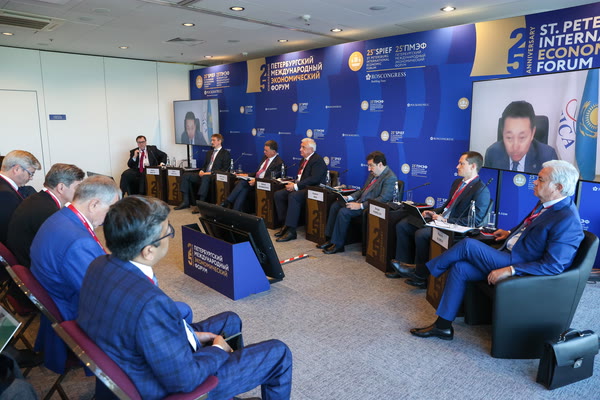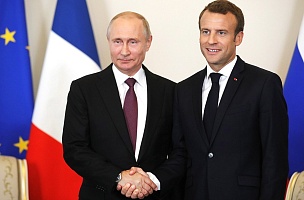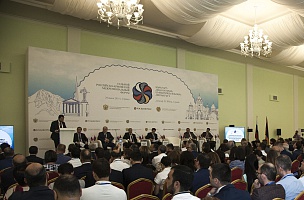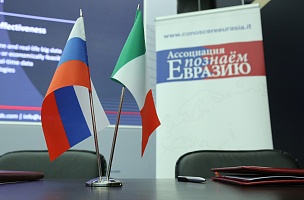Key conclusions
ASEAN – EAEU – SCO integration is proceeding rapidly, including in transport
“Above all, we need to look at infrastructure projects. The second line is project cooperation. We can [talk] lots and lots about mutual trade, about impediments and so on. In principle, the Agreement on Eurasian Economic Cooperation signed in 2014 is primarily a trade agreement. <…> This is important but the prospects are, after all, in joint integration projects,” Mikhail Myasnikovich, Chairman of the Board, Eurasian Economic Commission.
“Everything concerning infrastructure projects, that they are implemented by national governments, but it is very important that there exists, so to say, a striving for combine these infrastructure projects so that they work for everyone. Take the transport infrastructure, in particular, and the interconnection between the member states. These have been developing quite rapidly in recent times,” Rashid Alimov, Professor, Taihe Institute; Secretary General, Shanghai Cooperation Organisation, (2016–2018).
Inter-country cooperation: more than just trade
“One would, of course, want this to be cooperation and harmonization, whether in the legislative and regulatory or other spheres. To be cooperation not only in directing goods flows with all the accompanying infrastructure support (rails, spans, customs matters), to be more – scientific, technical, innovation and education. It will not be mandatory for all but depend on interest,” Alexander Pankin, Deputy Minister of Foreign Affairs of the Russian Federation.
“No economic projects can be effective unless they are orientated on the human factor, saving on and developing human resources. Tourism has also been mentioned in the discussion today. This is an active form of human communication; I think it could also become a driver of interaction between the CICA and international organizations in Big Eurasia,” Kairat Sarybay, Executive Director of the Secretariat, Conference on Interaction and Confidence Building Measure in Asia (CICA).
“Academic collaboration is a natural component of cooperation between countries, integration and other processes. <…> Each of these associations is to one degree or another involved in inter-higher educational institution interaction. There are network universities of the relevant structures and ASEAN launched this process back in the 1970s,” Vladimir Mau, Rector, Russian Presidential Academy of National Economy and Public Administration (RANEPA).
PROBLEMS
Security: a necessary condition for economic development
“Security is undoubtedly today one of the essential conditions for economic development; this is becoming obvious. Secondly, I assert that no advance is possible without a drawing together of national legislations and harmonization of legal systems,” Sergei Pospelov, Executive Secretary, Parliamentary Assembly of the Collective Security Treaty Organization.
“But we must look at questions of national security, specifically information security. Today we are all ‘digital’ and we are seeing sharp movements made by our non-partners against us, which can cause serious harm,” Mikhail Myasnikovich, Chairman of the Board, Eurasian Economic Commission.
Support needed from both business and the state
“Support from the authorities and business is essential, of course. <…> Businesses themselves itself, no matter how much they want to earn and expand, are unable to do so, of course, without support from the authorities not only of their own countries but also of partner countries. So interaction as part of such partnership will be both ‘business with business’ and ‘authorities with authorities’ and ‘authorities with business’,“ Alexander Pankin, Deputy Minister of Foreign Affairs of the Russian Federation.
“The first and most important thing for business is technical rules and regulation. Unless we resolve these issues, nothing will come of it. There will be barriers everywhere and goods won’t move between our countries. Another very important thing is what [will] there be for the people? It seems to me that a unified payment system should be set up here and we should issue a BRICS payment card,” Mikhail Myasnikovich, Chairman of the Board, Eurasian Economic Commission.
SOLUTIONS
Lack of competition between integration projects
“The answer to whether ASEAN, SCO, CIS, EAEU, BRICS and many other associations can be integrated and, if yes, in what format, is a simple one in our opinion: there’s no need to invent new organizational structures. Competition between integration projects should be avoided and use be made of each organization’s strong points and accumulated experience to develop our interaction to the maximum, synchronize work in specific fields on our agenda, and to take unified positions,” Denis Trefilov, Deputy Chairman of the Executive Committee – Executive Secretary of the Commonwealth of Independent States.
“Competition should be avoided. By the way, my member countries often tell me that the CICA should not replace, compete or counteract in some way. I think we have found our niche and that we serve a serious, extensive ‘outreach’ platform,” Kairat Sarybay, Executive Director of the Secretariat, Conference on Interaction and Confidence Building Measure in Asia (CICA).
Mutual support
“In this situation, striving to develop our organizations, we should seek mutual support, create the necessary conditions for cooperation, listen to one another’s opinions and cooperate on a productive basis, look for the best forms of official cooperation and new mechanisms for building a multilateral dialogue,” Zhang Ming, Secretary General, Shanghai Cooperation Organisation.
“Absolutely crucial and unambiguously essential for creating the new institutions and integration we are talking about today are basic principles and tasks. And the key thing is naturally for these principles to be understood the same way by all,” Denis Trefilov, Deputy Chairman of the Executive Committee – Executive Secretary of the Commonwealth of Independent States.
“We see that the Big Eurasia partnership cannot exist without a trend toward harmonization, a drawing together of legislation. It is clear that, in the EAEU, SCO and ASEAN [we have] the platform on which we are present today. But only within ASEAN do we currently have the parliamentary factor, meaning the other platforms lack this,” Sergei Pospelov, Executive Secretary, Parliamentary Assembly of the Collective Security Treaty Organization.
For more detail, see the roscongress.org Information and Analytical System.






